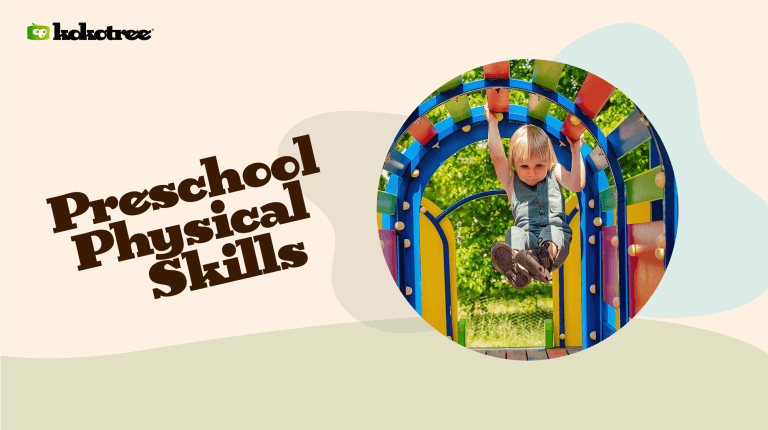

As parents, we want the best for our children, including healthy physical development skills. It is important to recognize that physical activity is essential to a child’s overall development and should be included in their daily routine.
Regular physical activity can help preschoolers develop strong muscles and bones and improve cognitive skills, social-emotional well-being, and more.
Let’s take a look at why physical development skills are essential for kids to learn in preschool curriculums and some of the benefits they can reap from them.
There are three main categories of physical development activities for preschoolers: fine motor skills activities, gross motor skills activities, and coordination, balance, and agility activities.
Fine and gross motor skills are essential for the development of preschoolers.
Fine motor skills involve the small muscles in the hands and fingers. They are necessary for activities like writing, cutting, and coloring.
Gross motor skills involve the larger muscles in the body and are critical for running, jumping, and climbing.
Examples of preschool fine and gross motor skills include using scissors, building with blocks, threading beads, playing on the playground, participating in sports activities, and dancing and moving to music.
Coordination, balance, and agility are crucial physical development skills preschoolers can learn through various activities.
Examples of activities to promote coordination, balance, and agility in preschoolers include:

Get free parenting tips, news, updates, and content from Kokotree.
Regular physical activity is vital for the health and well-being of preschoolers. It can help preschoolers maintain a healthy weight, build strong bones and muscles, and improve their overall health and well-being.
Incorporating health and fitness into the preschool curriculum can be achieved by incorporating regular outdoor play and physical activities into the daily routine.
Offering a variety of activities and games that promote movement and physical activity and encouraging healthy eating habits by providing healthy snacks and meals.
Outdoor play provides an excellent opportunity for preschoolers to engage in physical activity and explore the natural world. It can also promote creativity, problem-solving, and social skills.
Examples of outdoor activities and movement games for preschoolers include:
Regular physical activity benefits preschoolers, including maintaining a healthy weight, building strong bones and muscles, improving cognitive development, enhancing social-emotional well-being, better sleep quality and self-confidence.
Through regular physical activity, children learn how to handle their bodies better, which helps them develop better coordination skills that will serve them well when they start kindergarten.
They also gain an appreciation for how their body works, which allows them to understand how to keep it healthy through good nutrition habits.
Physical development is a crucial aspect of early childhood education, and what better way to teach it than through interactive and engaging games? Games are an excellent medium for developing various physical skills in preschoolers, such as hand-eye coordination, strength, balance, and motor skills.
By participating in these games, children not only get the exercise they need but also learn important life skills like teamwork, following directions, and problem-solving.
Promoting physical development in preschoolers is essential for their overall development and learning.
By providing opportunities for physical activity, outdoor play, and movement games, preschool educators can help the development of fine and gross motor skills, coordination, balance, and agility in young children.
This will help preschoolers develop the skills they need to be healthy, active, and engaged learners.



